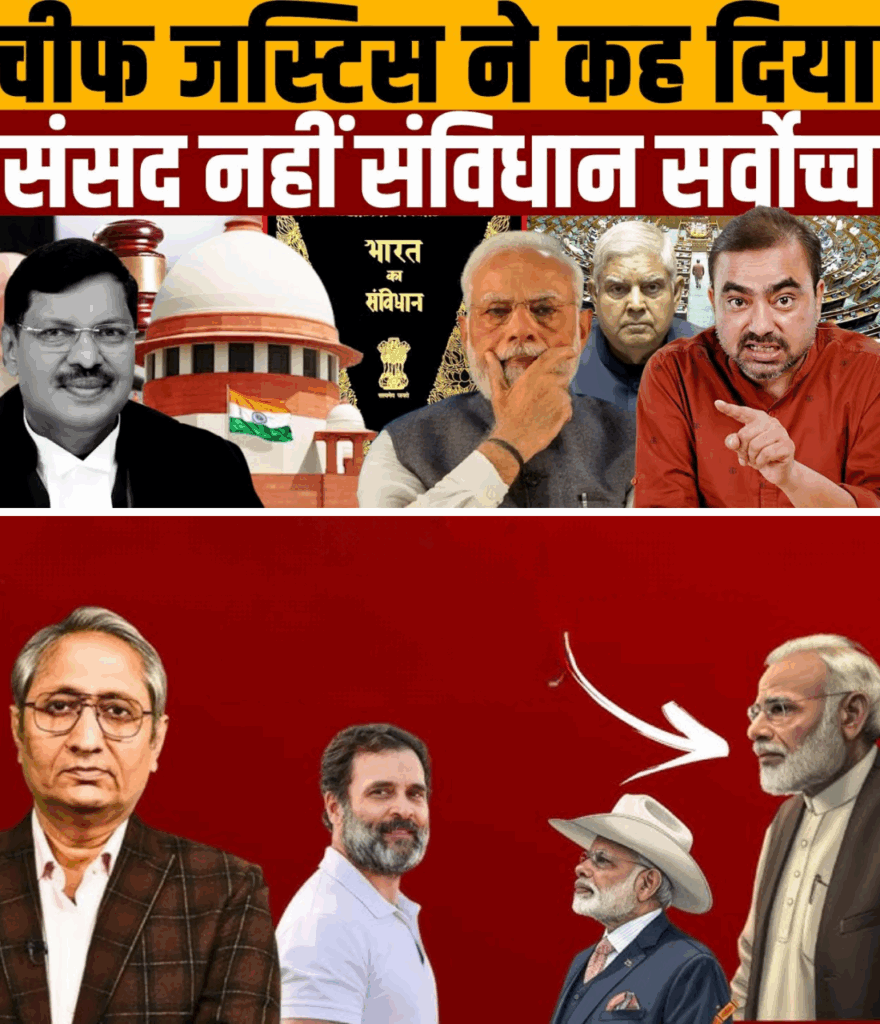Chief Justice BR Gavai Asserts: Constitution, Not Parliament, is Supreme in India
In a significant statement that has sparked debate across the country, Chief Justice of India (CJI) Bhushan Ramkrishna Gavai has firmly reminded political leaders and the public that the Constitution stands above all else in India’s democracy, not Parliament. His remarks come at a time when several leaders, including Vice President Jagdeep Dhankhar and ministers in the Modi government, have repeatedly emphasized the supremacy of Parliament, often criticizing Supreme Court decisions as challenges to parliamentary authority.
Speaking at a felicitation ceremony in his hometown Amravati, CJI Gavai, who is the first Buddhist and second Dalit to hold the country’s highest judicial office, stated, “Our democracy rests on three pillars—the judiciary, the executive, and the legislature—all of which function under the Constitution. None can claim to be supreme.” He further clarified, “Some people say Parliament is supreme, but in my view, it is the Constitution that holds the highest authority.”

He acknowledged Parliament’s power to amend the Constitution but stressed that “no one can alter its basic structure, under any circumstances.” This statement directly addresses the ongoing debate between the judiciary and the government over the limits of legislative power.
CJI Gavai also took the opportunity to remind judges of their fundamental duty to protect citizens’ rights and constitutional values. “A judge must never be concerned about public opinion regarding their decisions. Justice should be delivered independently, without being influenced by what people might say,” he said. He emphasized that he has always let his judgments and work speak for themselves, consistently upholding fundamental rights enshrined in the Constitution.
Referring to a landmark 2024 judgment, CJI Gavai mentioned the Supreme Court bench’s decision that declared the demolition of property solely based on accusations or convictions as unconstitutional. “Actions like demolishing homes cannot be carried out without due legal process. If it happens, the responsible officials will be held accountable,” he said.
These remarks are seen as a strong response to the Modi government, which has often asserted the supremacy of Parliament, especially when Supreme Court decisions go against government policies. Prime Minister Narendra Modi himself has repeatedly advocated for parliamentary sovereignty, notably during the 75th anniversary of the Constitution, where he described Parliament as the “first child” of the Constitution and criticized Article 370 for limiting Parliament’s powers.
The Supreme Court’s decision to strike down the electoral bonds scheme as unconstitutional further intensified this debate, with BJP leaders arguing that the scheme was enacted by Parliament and should therefore be valid. Union Minister Kiren Rijiju and Vice President Dhankhar have both publicly stressed the need to respect Parliament as the country’s highest legislative body.
However, critics point out that the government often invokes parliamentary supremacy only when Supreme Court rulings are unfavorable, while celebrating the Court’s decisions when they align with government interests—such as in the cases of Article 370, electoral bonds, or the Waqf Board law.
Justice Gavai has developed a reputation for speaking his mind. After being appointed Chief Justice of India, he announced at a Bar Council event that he would not enter politics after retirement, subtly criticizing former CJIs who accepted political roles. Throughout his judicial career, Justice Gavai has made several decisions that put the government in uncomfortable positions, such as declaring the third extension of ED Director Sanjay Mishra’s tenure illegal and granting bail to activist Teesta Setalvad in a high-profile case.
Justice Gavai has also emphasized judicial ethics and impartiality, warning that judges resigning to contest elections can undermine public trust in the judiciary. “Judicial integrity is a cornerstone of the legal system. If public trust erodes, people may seek justice outside the judicial system, potentially leading to mob justice and undermining law and order,” he said.
As the debate over the supremacy of the Constitution versus Parliament continues, CJI Gavai’s clear and assertive stance has reignited discussions about the true foundation of India’s democracy.
News
बस अड्डे का वह बच्चा — शहीद के बेटे की कहानी
बस अड्डे का वह बच्चा — शहीद के बेटे की कहानी बस अड्डा सुबह से ही शोरगुल से भरा था।…
गर्मियों की सुबह थी, करीब 9 बजे। आईपीएस साक्षी राजपूत अपने कार से एक गुप्त मिशन के लिए जा रही थीं।
आईपीएस साक्षी राजपूत की कहानी – वर्दी की असली ताकत गर्मियों की सुबह थी, करीब 9 बजे। आईपीएस साक्षी राजपूत…
Kajal Aggarwal’s recent accident has shaken her entire family to the core. The actress is currently unconscious and admitted to the ICU
Kajal Aggarwal’s Accident Leaves Family Devastated: Mother Breaks Down in ICU Kajal Aggarwal’s recent accident has shaken her entire family…
चौराहे पर सुनील और समोसे का ठेला – एक इंसानियत भरी कहानी (हिंदी में)
चौराहे पर सुनील और समोसे का ठेला – एक इंसानियत भरी कहानी (हिंदी में) मुंबई के एक व्यस्त चौराहे पर…
फिर वे अपना एटीएम कार्ड निकालकर राधा के हाथ में रखते हैं, “बैंक जाओ, इससे 500 रुपये निकालना। अंश के लिए दूध और घर के लिए थोड़ा राशन ले आना।”
राधा और बैंक – इज्जत का असली मतलब (हिंदी कहानी) एक दुबली-पतली दस साल की लड़की, राधा, अपने पाँच महीने…
कहानी: इज्जत, इंसानियत और किस्मत की सच्ची जीत
कहानी: इज्जत, इंसानियत और किस्मत की सच्ची जीत दिल्ली के एक पौश इलाके में राजीव मल्होत्रा का आलीशान बंगला था।…
End of content
No more pages to load






